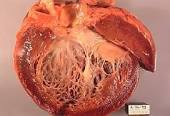“Given the frequency of cardiovascular risk factors in multiple myeloma patients as well as the cardiotoxicities associated with the different treatment regimens…”
First do no harm? Not when it comes to multiple myeloma chemotherapy regimens. Oncologists admit that cardiotoxic chemotherapy and radiation can damage your heart. Specifically, cardiotoxic therapies can cause permanent heart damage aka chemotherapy-induced cardiomyopathy. Damage that may worsen over time. I did with me.

I was diagnosed with MM in early 1994. I underwent cardiotoxic chemotherapies during my induction, consolidation and autologous stem cell transplant about a year later.
Nothing was said to me about possible heart damage. Nothing was indicated about my heart health. I was an otherwise healthy 35 year old man.

I believe that chemotherapy- induced heart damage is under-reported. I say this because we MM patients are followed in the months and first few years after our active therapies. As an example, I developed chronic A-Fib 15 years after my ASCT and a diagnosis of chemotherapy-induced cardiomyopathy several years after that.
MM patients need to understand that many chemotherapies cause heart damage.
The chemotherapies that I underwent that can cause heart damage:
- Adiamycin-
- Cytoxan (cyclophosphamide)-
- Busulphan-
- Melphalan-
Further, studies show that this heart damage can increase or get worse over time. Or maybe it takes years for certain types of heart damage to show-up.
If you are considering heart damaging chemo or radiation, the question for you to answer is if there is anything you can do to limit or prevent heart damage. And the answer is yes. There are two supplements that have been shown to prevent heart damage in chemotherapy administration.
The trick is to take each DURING chemo. Yes, I think you can limit long-term damage from chemo by taking these supplements but I don’t think you can heal your heart completely. At least I haven’t healed my heart damage.
To discuss heart healthy lifestyle therapies (moderate exercise, nutrition, etc.) with a long-term multiple myeloma survivor working to heal his chemotherapy-induced cardiomyopathy, scroll down the page, post a question or a comment and I will reply to you ASAP.
Thank you,
David Emerson
- Cancer Survivor
- Cancer Coach
- Director PeopleBeatingCancer
Recommended Reading:
“Multiple myeloma treatment regimens consist of proteasome inhibitors (bortezomib, carfilzomib, and ixazomib), immunomodulatory drugs (thalidomide, lenalidomide, and pomalidomide), and steroids. In this paper, we will review the pathophysiology and associated cardiotoxicities of the different multiple myeloma therapeutic modalities and present methods to mitigate the development of cardiovascular complications.
Although proteasome inhibitors and immunomodulatory drugs have led to significant improvements in oncologic outcomes, there is increasing evidence of serious cardiovascular side effects which may be exacerbated in the setting of underlying cardiovascular risk factors or disease.
Cardiotoxicities include cardiomyopathy and heart failure, accelerated hypertension, arrhythmias, and both arterial and venous thromboembolism.
Given the frequency of cardiovascular risk factors in multiple myeloma patients as well as the cardiotoxicities associated with the different treatment regimens, it is essential to closely monitor these patients. Collaboration between cardiologists and oncologists is necessary to ensure patients receive optimal cancer treatment while minimizing cardiovascular risk.
“The findings of this study may suggest that inhibition of fatty acid oxidation in the heart is at least a part of doxorubicin cardiotoxicity and that L-carnitine can be used to prevent the doxorubcin-induced cardiac metabolic damage without interfering with its antitumour activities.”
“Preclinical and clinical studies suggest that anthracycline-induced cardiotoxicity can be prevented by administering coenzyme Q10 during cancer chemotherapy that includes drugs such as doxorubicin and daunorubicin. Studies further suggest that coenzyme Q10 does not interfere with the antineoplastic action of anthracyclines and might even enhance their anticancer effects…”




